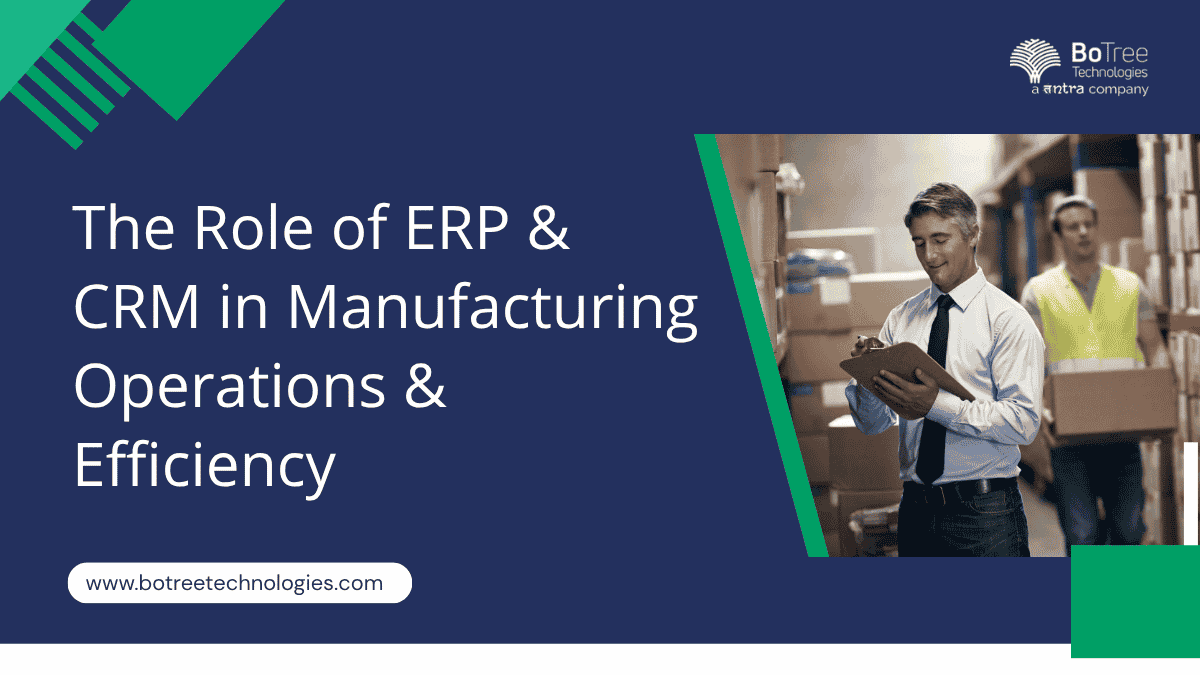
The Role of ERP & CRM in Manufacturing Operations & Efficiency
Tired of juggling spreadsheets, manual handoffs, reactive processes? This article shows how ERP in manufacturing and CRM in manufacturing unite to overhaul your shop-floor workflows and customer interactions. You’ll see how Manufacturing ERP systems optimize production planning, inventory control, supply-chain management, while Manufacturing CRM systems boost sales alignment, service responsiveness, and data-driven client engagement. When combined through ERP and CRM integration, you gain unified data, automated processes, and actionable insights. The result: streamlined operations, happier customers, agile, competitive manufacturing business. Continue reading to learn more.
Imagine this: It’s Monday morning, and you’re on the factory floor making your weekly tour of duty. Machines rumble, conveyors move, and yet your production schedule is a moving target. You look at piles of paper – and that’s when you know you’re juggling two worlds: the real one of raw materials, machines, and people, and the virtual one of spreadsheets, emails, and customer questions. That divide kills momentum.
Enter ERP in manufacturing and CRM in manufacturing – two great engines that, when connected, can turn that chaotic scenario into an expertly choreographed ballet. Manufacturing ERP systems address procurement, stock, and production scheduling and planning on one end. Manufacturing CRM systems monitor leads, orders, and service requests on the other, and power customer loyalty. Combine them through ERP and CRM integration, and you open Manufacturing operations efficiency that resonates from shop floor to boardroom.
This article contends that contemporary manufacturers have to consider ERP software for the manufacturing industry as well as CRM software for the manufacturing firm as not two island entities, but as twin pillars of Digital transformation in manufacturing. By integrating these systems – via off-the-box ERP solutions in manufacturing or tailored work by an in-house software development firm – you propel Manufacturing operations optimization, gratify customers, and future-proof your business.
ERP in Manufacturing – Streamlining Production & Supply Chains
When we refer to ERP in manufacturing, we are referring to something more than simply software on a server. We’re referring to a digital core that manages all the steps: sourcing steel, scheduling shifts, monitoring labor hours, and even compliance documentation. Picture erasing frantic whiteboard scribbles with an automated supply chain management systems dashboard updating in real time.
- Production Planning and Scheduling
Classic planning tends to rely on intuition or last quarter’s history. New ERP solutions for manufacturers rely on forecasts of demand, machine capacity, and available labor to create optimized schedules. That’s real-time planning that responds to a late shipment of parts or unexpected rush orders.
- Inventory Management
Overstocks and stockouts hurt the bottom line. With Manufacturing ERP systems, you monitor raw materials, work-in-progress, and finished goods all the way to the dock of the customer. Automated reorder points, based on sales forecasting, avoid surprises – and release your working capital.
- Supply Chain Management Systems
Procurement, vendor scorecards, shipment tracking – these are usually resident in standalone silos. A unified ERP in manufacturing solution consolidates them together. You benchmark supplier performance, streamline lead times, and negotiate good deals with a click.
- Manufacturing Process Automation
From data gathering on the shop floor to quality-check processes, automation eliminates manual handoffs. A single, integrated ERP system sends out alerts when tolerances wander or yield falls, so you catch problems early.
By implementing ERP solutions for manufacturing – be it an off-the-box platform or a customized solution developed by a software development services provider – you slash planning cycles, minimize late orders, and enhance on-time delivery rates. On the ground, firms commonly realize a 15–25% gain in efficiency of operations in manufacturing within the first year.
CRM in Manufacturing – Building Deeper Customer Connections
Yes, ERP drives the back end. But what about the front end? That’s where CRM for manufacturing kicks in. Your customers aren’t just orders; they’re relationships built on on-time delivery, open communication, and prompt service.
- Sales and Marketing Alignment
A Manufacturing CRM systems platform consolidates leads, contact history, and proposal information. Qualified leads are automatically sent to sales reps, and they are able to view production capacity so they guarantee deliverable dates. That coordination accelerates faster deal closure.
- Customer Service Excellence
After delivery comes service. Whether you’re repairing a complex machine or providing spare parts, CRM software for manufacturing companies ensures your service team has instant access to order history, warranties, and serial-number data. That context boosts first-time fix rates and customer satisfaction.
- Data Management for Better Decisions
All that customer information – purchase levels, feedback, service calls – comes into a single dashboard. You see product performance, common problems, and cross-sell opportunities. An optimized CRM manufacturing example can highlight at-risk accounts before they churn.
- Customer Lifecycle Management
From the initial onboarding of a new account through the renewal of service contracts, CRM workflows direct every interaction. Automated maintenance or contract renewal reminders keep you in front of customers, reinforcing trust and loyalty over the long term.
Implementing CRM solutions for manufacturing – either through a top provider or an on-site custom software development firm – makes all customer interactions matter. Cross-sell rates increase, churn decreases, and marketing ROI improves, achieving a solid return on your CRM investment.
ERP and CRM Integration – Unifying Data for Manufacturing Operations Efficiency
What sorcery occurs when you integrate your Manufacturing ERP systems and Manufacturing CRM systems? You fragment silos, remove redundant data entry, and drive end-to-end automation.
- Unified Data: Sales orders entered in CRM automatically feed through to your ERP for production planning and scheduling, inventory reservation, and finance postings. As soon as the goods are shipped, fulfillment data feeds back to update the customer record.
- Process Automation: With ERP and CRM integration solutions, you set up triggers between departments. An order worth a lot can trigger credit checks, material reservations, order confirmation, and shipment notices – all automatically.
- Improved Reporting: Merge operational metrics (machine uptime, yield rate, inventory days) with customer KPIs (NPS, repeat order percentage, service ticket resolution time) into unified dashboards. That single view drives more intelligent strategy meetings and better forecasts.
- Cross-Functional Data Integration: Sales, marketing, operations, and finance all view the same real-time data. When service logs indicate shared failure modes, engineering can focus on design enhancements. Or if sales tracking indicates scorching demand for a custom setup, you can realign material buys accordingly.
Businesses that embrace ERP and CRM integration don’t just optimize individual functions – they elevate the entire enterprise. You’ll cut lead times, boost on-time delivery, and accelerate cash-to-cash cycles, translating into stronger profitability and resilience.
Manufacturing ERP Systems – The Backbone of Production and Digital Transformation in Manufacturing
Your Manufacturing ERP systems are the virtual nerve center of your factory. They track each chip of raw material used up, every second a motor hums, and every penny of cost incurred. But today’s ERP does more, grounding your Digital transformation in manufacturing journey.
- Master Planning: Current ERP systems integrate advanced demand-planning algorithms, fueled by historical sales and market trends. That minimizes forecast error and liberates you from firefighting.
- Shop-Floor Control: Real-time machine monitoring, labor tracking, and downtime records are directly fed into the ERP. You detect hotspots before they are crises, allowing Manufacturing process automation and proactive maintenance.
- Cost Accounting: Those were the days when costing was once-a-month digging through ledgers. ERP now offers job-by-job, lot-by-lot cost accumulation, providing you with accurate margins on every product variant.
- Compliance and Quality: Integrated modules for quality track inspections, record non-conformances, and initiate corrective measures. They create audit trails to comply with regulators and assure your customers.
Regardless of whether you go with a cloud-based ERP solution for manufacturing suite or a custom platform from the leading software development firm, the objective remains the same: to create a foundation that grows with you, accommodates new business models, and encourages ongoing improvement at all of your sites.
Manufacturing CRM Systems – Orchestrating Sales, Service, and Growth
Let’s turn the camera around to the customer. CRM systems for manufacturers aren’t about addressing and call logs – they manage your whole front-office environment.
- Configure-Price-Quote (CPQ): For configurable equipment manufacturers, CPQ is a game-saver. Reps select choices within guided UIs, and the CRM automatically determines prices, checks configurations, and creates professional proposals.
- Service Management: A strong CRM manages warranties, schedules maintenance, and sends field technicians out with the parts and diagnostics required. Mobile apps are synchronized in real time, so all service events are entered into the central system at once.
- Field Mobility: Today’s CRM software for manufacturing companies includes offline-capable mobile apps. Whether you’re at a customer site with lousy reception or out in the plant on a forklift, data capture and updates flow back to headquarters seamlessly when connectivity returns.
- Analytics and Insights: Embedded dashboards show lead-to-order conversion rates, average deal size, service response times, and more. That data drives coaching conversations and marketing adjustments.
By investing in Manufacturing CRM systems – either through a top SaaS vendor or a custom software development firm – you provide your teams with the tools necessary to win business and delight customers, even as complexity increases.
Manufacturing Operations Efficiency – Optimizing Every Process
Ultimately, all these parts add up to Manufacturing operations efficiency. You need all of your assets – equipment, materials, and staff – performing at full capacity. Integrated ERP and CRM take you there in this way:
- Simplifying Manufacturing Processes
End-to-end visibility points out waste and friction in real time. You can initiate focused Lean projects, supported by data, to drive out non-value-add activities. - Production Planning and Scheduling
Dynamic scheduling engines adapt to machine downtime, material shortages, or unexpected order changes. That flexibility keeps you on deadline and customers satisfied. - Manufacturing Process Automation
Automate the release of work-orders, quality checks, maintenance reminders, and even customer alerts. Eliminate manual handoffs and see errors dive.
- Supply Chain Management Systems
Close ties to suppliers à la ERP in manufacturing let you hone just-in-time ordering without worrying about stockouts. Reduced inventory levels, accelerated cash turns.
All these enhancements by a custom software development company build on each other, providing a compounding multiplier effect to throughput, cost reduction, and service level. You’ll reach profitability goals more consistently – and with less anxiety.
Real-World Applications and Case Studies
Theory is good – but you need evidence. Below are three instances of ERP and CRM implementation in manufacturing that sparked tangible results:
Case Study 1: Electronics Precision
A contract manufacturer upgraded disparate spreadsheets to an integrated ERP and CRM integration solution. They cut build-to-ship times by 30% and scrap by 18%, with automated quality checks being fed back into both systems.
Case Study 2: Custom Machinery
A custom equipment manufacturer implemented Manufacturing CRM systems with CPQ and field-service modules. Quotes that previously took days now take minutes to generate, and the first-time fix rates increased to 95%. Revenue per service call increased by 22%.
Case Study 3: Global Supplier
An auto parts manufacturer deployed cloud-based Manufacturing ERP solutions and CRM, tied together with ERP and CRM integration services of a software product engineering services company. They were able to deliver 98% on-time all over the world, reduced inventory by 25%, and expanded margins by 12% in two years.
Choosing the Right ERP and CRM Systems
Ready to jump in? Here’s how to select ERP and CRM for a manufacturing firm:
- Evaluation Criteria
Map your critical workflows – Procure-to-Pay, Order-to-Cash, Service-to-Renewal – and determine must-have functionality (MRP, CPQ, service scheduling, analytics).
- Customization & Scalability
Verify your vendor or custom software development firm can customize screens, reports, and integration points. Make sure the architecture extends to multiple plants and geographies.
- Vendor Evaluation
Find a software development firm or best software development firm with extensive manufacturing expertise. Verify references within your industry vertical.
- Solution Types
Choose cloud-based vs. on-premises ERP for manufacturing and CRM for manufacturing. Consider IT resources, data-residency requirements, and cost of ownership.
- Supporting Services
Ensure your software development company provides strong software development services, training initiatives, and continuous support. A genuine software product engineering services company will help you through go-live and beyond.
Final Thoughts
If you’ve ever experienced the feeling of being trapped in reactive firefighting – rushing to fulfill late orders, begging for parts, switching between customer calls – rest assured there’s a better way. Contemporary Manufacturing ERP software and Manufacturing CRM software, tied together by ERP and CRM integration, reboot the script. You transition from fractured processes to intuitive workflows, from guessing to data-driven decisions, and from band-aid fixes to ongoing improvement.
Regardless of choosing top ERP solutions for manufacturing, best-in-class CRM solutions for manufacturing, or hiring a software development firm for a tailored solution, the result remains the same: a boost in Manufacturing operations efficiency, increased agility, and a happier customer base. It’s not software – it’s the driver of Digital transformation in manufacturing.
Ready to transform your factory into a finely tuned, digitally enabled behemoth? Let’s begin crafting your integrated ERP and CRM blueprint today.
Schedule a call with Tntra now!
FAQs
Q1. How does ERP improve manufacturing efficiency?
ERP automates production planning and scheduling, inventory management, and quality control, slashing manual tasks and reducing errors for smoother operations.
Q2. What is the role of CRM in manufacturing operations?
CRM aligns sales, marketing, and service teams around customer data, driving faster quote cycles, superior service, and higher retention.
Q3. Can CRM help improve manufacturing sales and service?
CRM software for manufacturing companies streamlines CPQ, field service, and customer communications, boosting revenue per account and service profitability.
Q4. Why is ERP and CRM integration essential for manufacturers?
Integrated systems deliver a unified data model, automate cross-functional workflows, and enable holistic reporting – key to Manufacturing operations optimization.




